Hiring skilled developers is no longer about resumes or job boards - it’s about assessing real coding activity and community involvement. Platforms like GitHub, Stack Overflow, and specialized tools such as HackerRank and CodinGame allow recruiters to evaluate candidates based on actual contributions, problem-solving, and technical expertise.
Key Takeaways:
- GitHub: Analyze code quality, contributions, and collaboration.
- daily.dev Recruiter: Engage with pre-qualified developers through double opt-in connections.
- HackerRank: Conduct coding challenges and live assessments.
- Stack Overflow: Review Q&A participation to gauge problem-solving.
- CodinGame: Use gamified coding tasks to test skills.
- Qualified.io, Coderbyte, and iMocha: Offer customizable coding tests and ATS integrations.
These tools streamline sourcing and identify qualified technical candidates in minutes, and help connect with both active and passive candidates. By integrating these platforms into your hiring process, you can better identify and engage top tech talent.
We Ranked Top 10 Tools for Recruiting Developers
1. daily.dev Recruiter
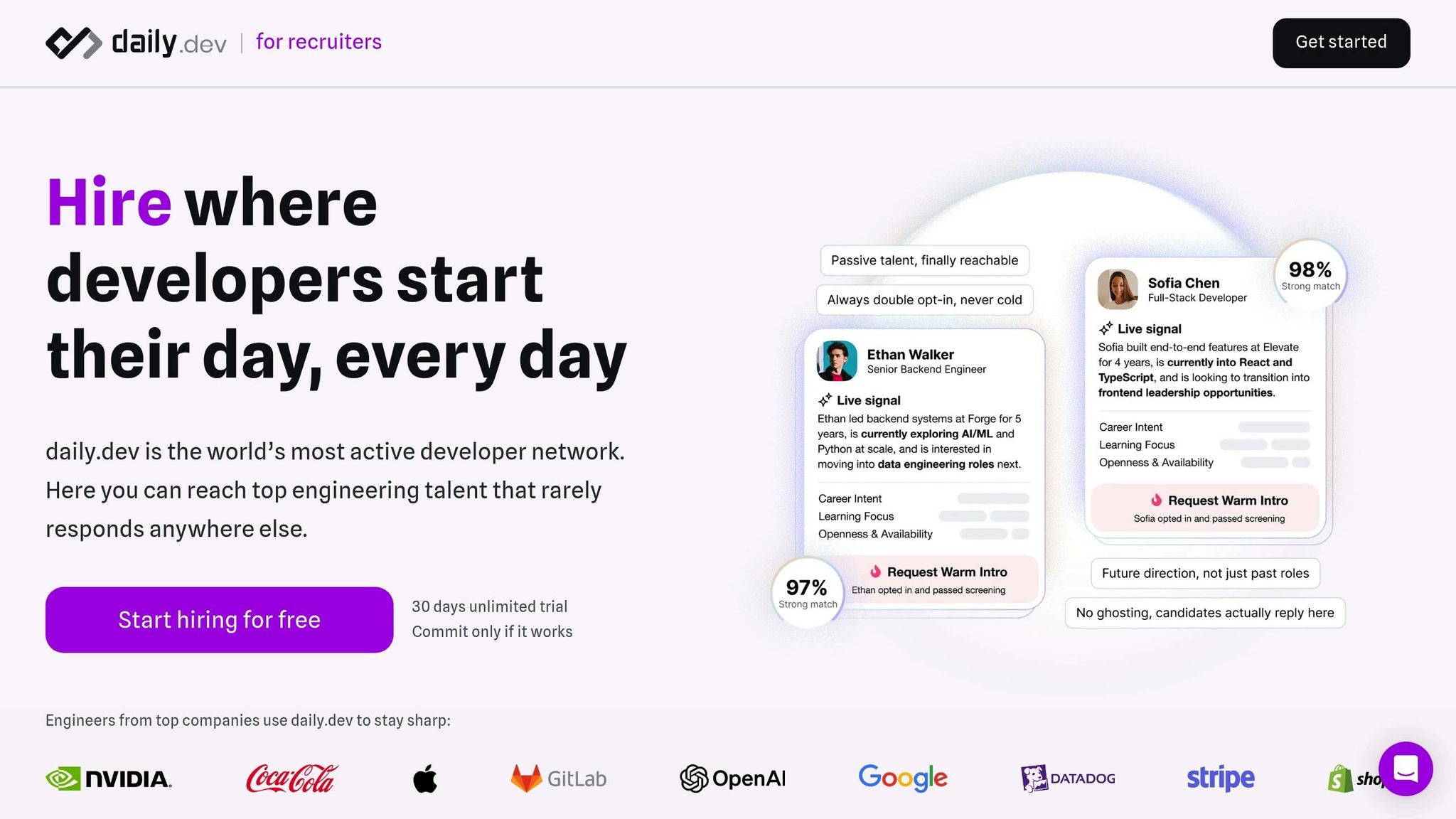
daily.dev Recruiter is a hiring platform crafted specifically for developers, connecting employers with pre-qualified talent from the vibrant daily.dev community. With 150,000 active monthly developers as of 2024 , it provides a solid foundation for tracking developer engagement and activity.
Developer Engagement and Activity Tracking
This platform offers real-time insights into how developers engage with coding-related content, such as articles, tutorials, and open-source projects. By monitoring these interactions, recruiters gain a clear understanding of candidates’ current interests and ongoing skill development.
For example, recruiters can identify developers actively engaging with topics like React and tailor their outreach accordingly. This data-driven personalization can increase response rates by an impressive 30% .
Integration with ATS and Recruitment Tools
daily.dev Recruiter seamlessly integrates with popular applicant tracking systems (ATS), simplifying the process of importing candidate data, monitoring engagement, and managing outreach efforts.
For U.S.-based recruiters, the platform is designed with localization in mind - it displays currency in USD, uses the MM/DD/YYYY date format, and works with widely-used American ATS platforms. These features ensure a smooth and user-friendly experience for domestic hiring teams.
Global Reach and Candidate Accessibility
The platform opens the door to a diverse global talent pool, making it an excellent choice for distributed teams or roles requiring specialized skills.
With pricing starting at $99 per month for basic access , daily.dev Recruiter offers tiered plans that include advanced features and integrations at higher levels. The platform enjoys strong support from tech recruiters, boasting an average rating of 4.7/5 on major review sites . Users often highlight its simplicity and effectiveness in finding engaged developers.
One of the standout features of daily.dev Recruiter is its double opt-in connection process. This ensures that developers only engage with recruiters if they’re genuinely interested, reducing spam and creating a more trust-based interaction. For recruiters, this means connecting with candidates who are ready and willing to have meaningful conversations - eliminating the noise of cold emails and endless screening calls. It’s a refreshing shift toward a more intentional and credible hiring process.
2. GitHub
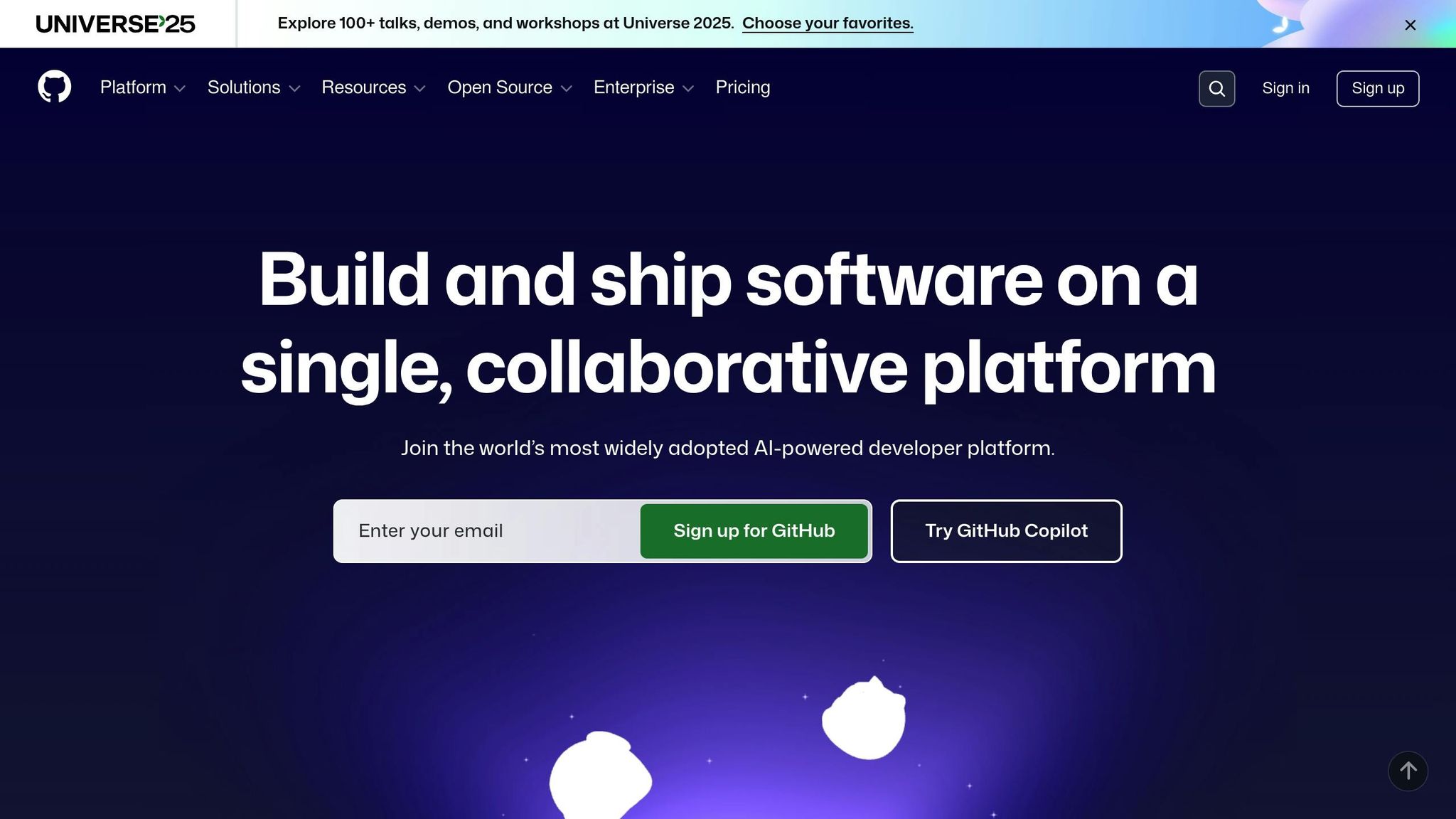
GitHub is the largest code repository in the world, boasting over 100 million developers as of 2023 . For recruiters, it’s a treasure trove of talent where developers showcase their actual work, not just list their skills on a resume. Unlike traditional job boards, GitHub offers a unique window into real-world coding, project contributions, and collaboration habits.
Developer Engagement and Activity Tracking
With its massive user base, GitHub provides recruiters with a wealth of data to evaluate how developers work. Metrics like contribution graphs, commit frequency, pull requests, and issue participation offer a clear picture of a candidate’s coding activity and enthusiasm for development . These insights often reveal more about a developer’s engagement than a resume ever could.
For example, consistent commits over time highlight reliability, while contributions to multiple repositories showcase adaptability. Active participation in issues and pull requests, along with well-maintained repositories, are strong indicators of a developer’s dedication and collaborative mindset.
It’s no surprise that major companies like Netflix, Facebook, and Airbnb leverage GitHub for recruiting. They identify contributors to popular open-source projects, evaluating their code quality and teamwork . This approach works - one Python-focused startup reported a 40% higher response rate and a 30% reduction in time-to-hire by sourcing candidates directly from GitHub’s open-source community .
Skill Assessment Capabilities
GitHub shines when it comes to assessing skills based on real work. By reviewing code quality, project documentation, and problem-solving in public repositories, recruiters can evaluate both technical expertise and collaboration abilities . This kind of evidence-based assessment is far more insightful than traditional resume screening.
The platform essentially acts as a living portfolio, showcasing a developer’s technical skills, communication style, and community involvement . Recruiters can go beyond identifying programming languages - they can assess how well candidates write code, document their work, and tackle complex challenges.
When examining profiles, focus on quality over quantity. Look for repositories with clear documentation, meaningful commit messages, and evidence of teamwork through pull requests and issue discussions . These elements not only reflect technical competence but also highlight professional communication skills.
Integration with ATS and Recruitment Tools
Although GitHub doesn’t directly integrate with most applicant tracking systems (ATS), third-party tools like AmazingHiring bridge the gap. These tools pull GitHub data into ATS platforms, analyzing coding activity and skills with AI to streamline candidate tracking. This eliminates the need for manual data entry, making the hiring process more efficient.
GitHub’s advanced search features also allow recruiters to pinpoint candidates with precision. Using Boolean search strings and filters - such as programming language, location, or repository stars and forks - recruiters can find developers with highly specific technical backgrounds . These capabilities far surpass the search options available on traditional job boards.
Global Reach and Candidate Accessibility
GitHub’s global user base makes it a powerful tool for accessing talent worldwide, especially for U.S.-based recruiters looking for specialized skills or building distributed teams . Its international reach allows companies to tap into a diverse pool of developers, spanning multiple time zones, which is particularly useful for organizations operating across regions.
That said, global hiring comes with its own considerations, such as time zone differences, language proficiency, and legal requirements for remote work. GitHub’s location filters and language indicators can help recruiters zero in on candidates who meet these criteria for U.S.-based roles .
One of GitHub’s standout advantages is its ability to uncover passive candidates - developers who aren’t actively job hunting but might be open to the right opportunity . By analyzing activity patterns and project involvement, recruiters can identify hidden gems who may not appear on job boards but are perfectly suited for niche roles.
3. Stack Overflow
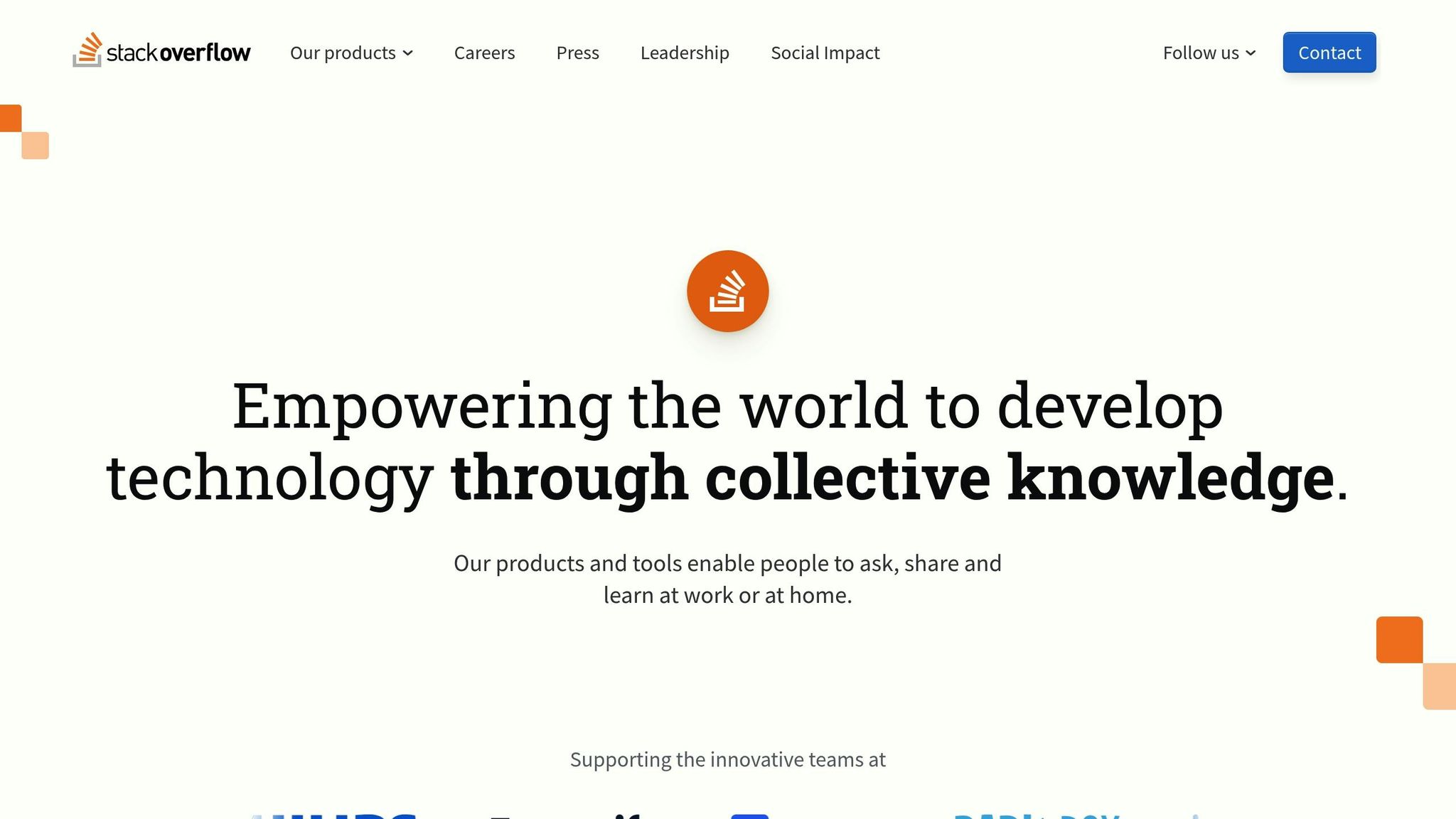
Stack Overflow stands out as the go-to Q&A community for developers. By tapping into this platform, recruiters gain more than just access to a talent pool - they get a real-time look at developers' problem-solving abilities and technical skills through their questions and answers. It's like seeing a developer's skills in action, beyond the confines of a traditional resume.
What makes it even more powerful is how Stack Overflow for Teams integrates effortlessly with popular Applicant Tracking Systems (ATS) like Greenhouse. This connection bridges recruitment workflows with developer insights, making the hiring process smoother and more informed.
4. CodinGame
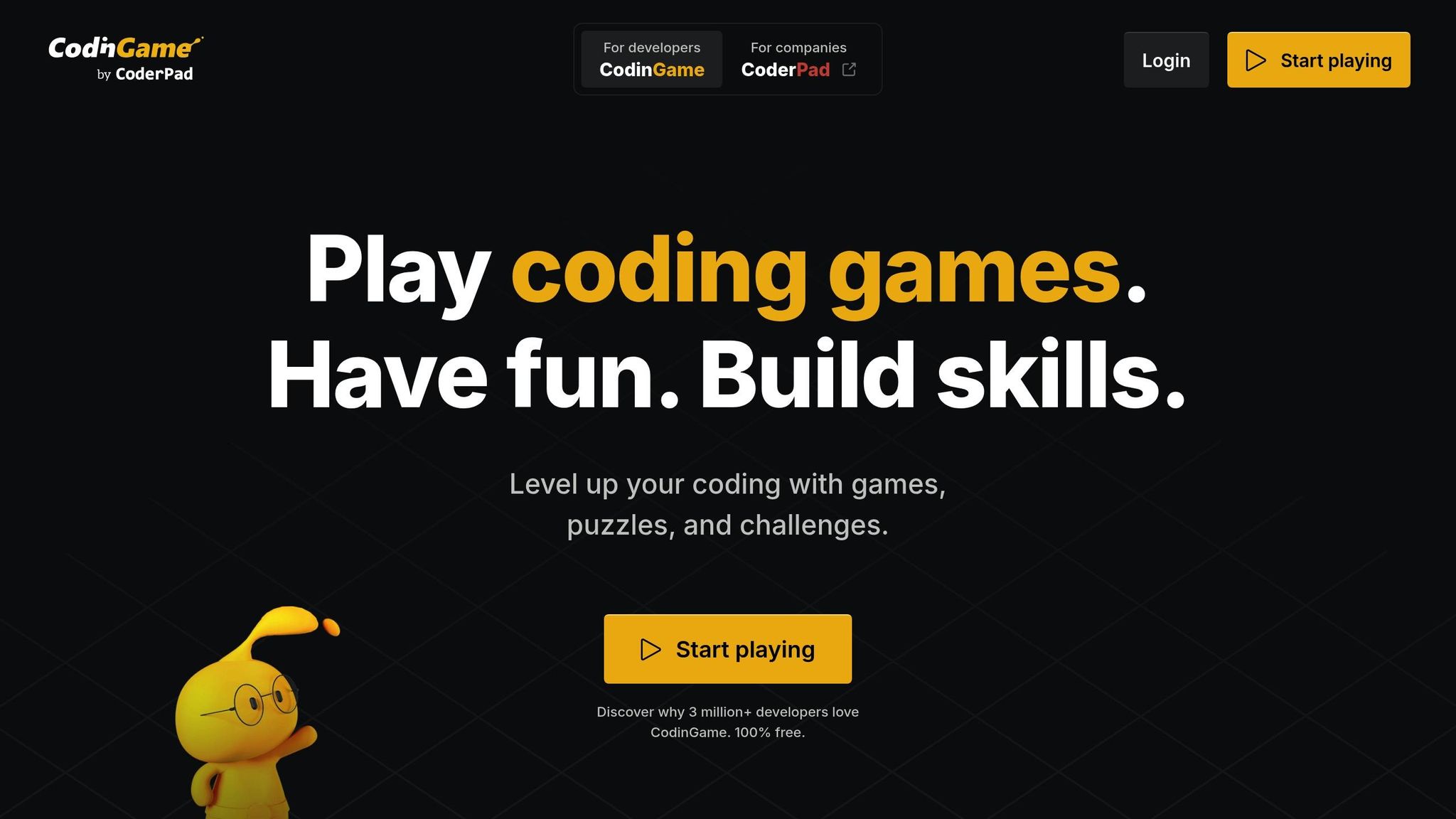
CodinGame takes coding assessments to the next level by turning them into interactive, game-like challenges that mimic actual development tasks. This approach gives recruiters a chance to see how candidates perform in scenarios that feel closer to real-world programming. It's a fresh way to measure problem-solving skills and aligns with the growing emphasis on practical coding evaluations.
Skill Assessment Capabilities
With challenges available in various programming languages and levels of difficulty, CodinGame allows recruiters to customize tests based on the role's requirements. These puzzles not only measure technical expertise but also gauge creative problem-solving abilities. The platform evaluates submissions automatically, checking for code quality, efficiency, and correctness, and then generates detailed reports to guide hiring decisions.
Integration with ATS and Recruitment Tools
CodinGame Assessment fits seamlessly into recruitment workflows thanks to its API and direct integrations with popular ATS platforms like Greenhouse, iCIMS, BambooHR, Lever, Jobvite, Workable, SmartRecruiters, and Oracle Taleo . This setup makes it easy to embed coding tests into existing systems, simplifying tasks like candidate tracking and interview scheduling .
Global Reach and Candidate Accessibility
The platform's gamified and engaging interface is accessible worldwide, enabling candidates to complete assessments from virtually anywhere. This global reach helps recruiters tap into a diverse talent pool, including remote candidates across different time zones. For more on managing this process, see our guide to hiring remote developers.
5. Qualified.io
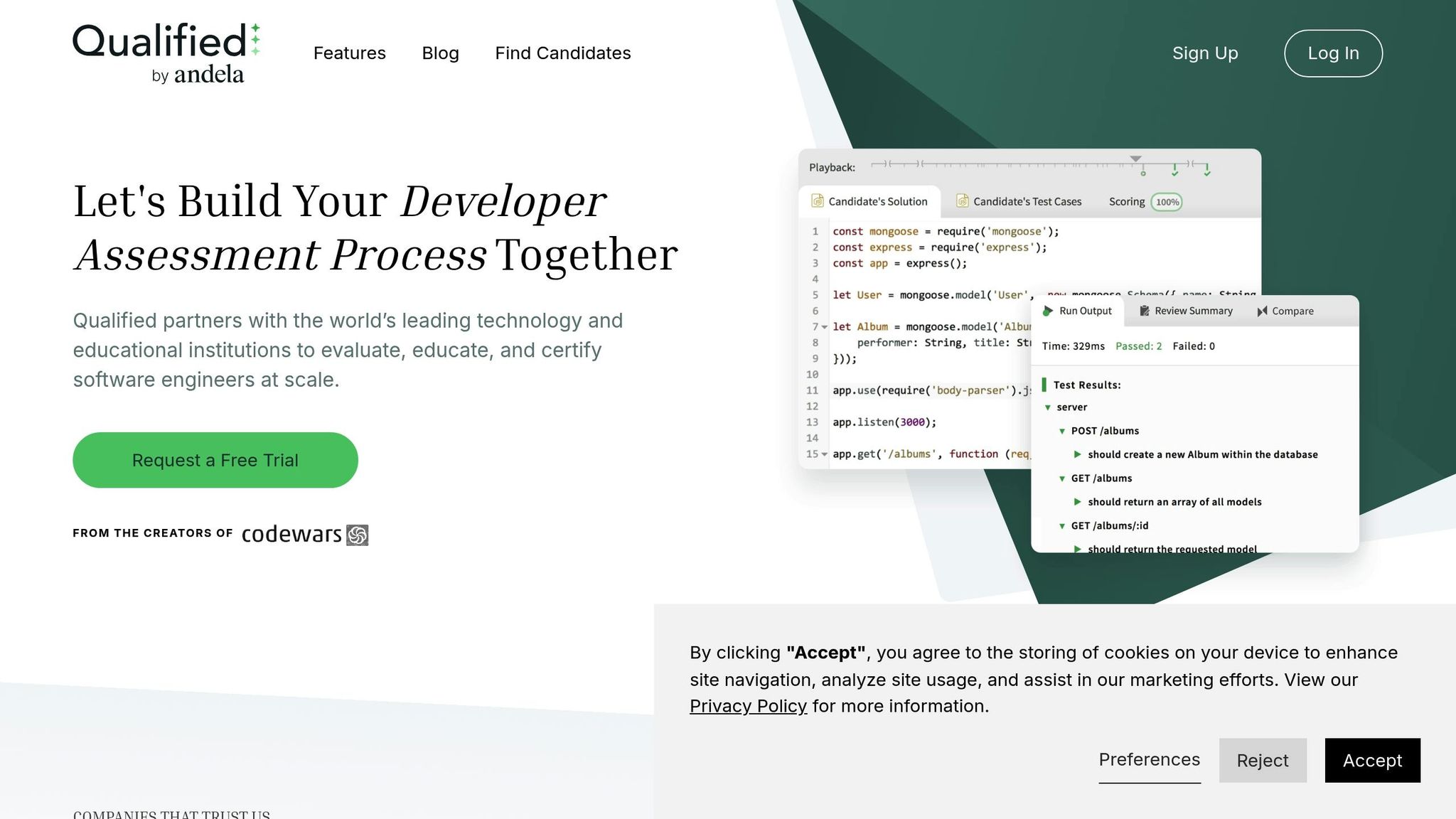
Qualified.io is one of several coding test platforms for hiring designed to help recruiters evaluate candidates through hands-on, practical tests.
Integration with ATS and Recruitment Tools
Qualified.io works seamlessly with various recruitment workflows by offering integrations with popular applicant tracking systems (ATS). It directly connects with platforms like Greenhouse, Workable, BambooHR, Lever, and Recruitee . For ATS platforms that don’t support direct integration, Qualified.io uses Zapier to link with systems such as BreezyHR, BrightMove, Crelate, Smartjoboard, ATS Anywhere, and Zoho Recruit . Setting up a Zap is quick and takes users less than six minutes on average . Impressively, 87% of Forbes Cloud 100 companies rely on Zapier, and 93% of its users report improved performance . Additionally, the platform supports custom integrations through REST API and webhook functionality.
| Integration Type | Compatible ATS Platforms |
|---|---|
| Direct Integrations | Greenhouse, Workable, BambooHR, Lever, Recruitee |
| Via Zapier Connectors | BreezyHR, BrightMove, Crelate, Smartjoboard, ATS Anywhere, Zoho Recruit |
Qualified.io’s cloud-based design ensures smooth remote assessments, making it a reliable tool for modern recruitment needs.
Global Reach and Candidate Accessibility
With its cloud-based infrastructure, Qualified.io enables remote assessments without requiring additional software. This feature is particularly valuable for supporting remote hiring and international recruitment efforts, following best practices for hiring remote technical talent giving recruiters access to a broader and more diverse talent pool worldwide.
Hiring engineers?
Connect with developers where they actually hang out. No cold outreach, just real conversations.
6. HackerRank
HackerRank is both a competitive programming platform and a recruitment tool, designed to help companies identify and evaluate coding talent through challenges, contests, and assessments.
Developer Engagement and Activity Tracking
HackerRank draws in millions of developers who actively participate in challenges, earning rankings and badges that reflect their coding abilities. Gamified features like leaderboards and custom contests encourage developers to enhance their skills and build impressive coding portfolios.
The platform tracks key metrics, such as challenge completion rates and problem-solving speed, across areas like algorithms, data structures, artificial intelligence, and database management. Recruiters can explore a candidate’s HackerRank profile to review their rankings, badges, and specific skills demonstrated through completed tasks.
For companies, hosting custom coding contests offers a unique way to engage talent. These contests simulate real-world scenarios, providing insights into how candidates perform under time constraints and tackle practical challenges.
Skill Assessment Capabilities
HackerRank features pre-built assessments that simulate work environments, including coding challenges, multiple-choice questions, and project evaluations. The platform’s CodePair tool enables live collaborative coding sessions, complete with automated scoring, plagiarism detection, and video proctoring to ensure fairness.
Integration with ATS and Recruitment Tools
HackerRank simplifies recruitment by seamlessly integrating with major applicant tracking systems (ATS) like Greenhouse, Workday, Lever, SmartRecruiters, and iCIMS. Its API also allows for custom integrations with other recruitment solutions.
Recruiters can embed assessment links directly into job applications, with results automatically appearing on dashboards. These dashboards provide pass/fail indicators and detailed performance analytics to streamline candidate evaluation.
Global Reach and Candidate Accessibility
HackerRank connects companies with a diverse global talent pool, offering multi-language support, a mobile-friendly interface, and built-in accessibility features. Additionally, its university program bridges the gap between recruiters and emerging talent from academic institutions worldwide.
7. Coderbyte
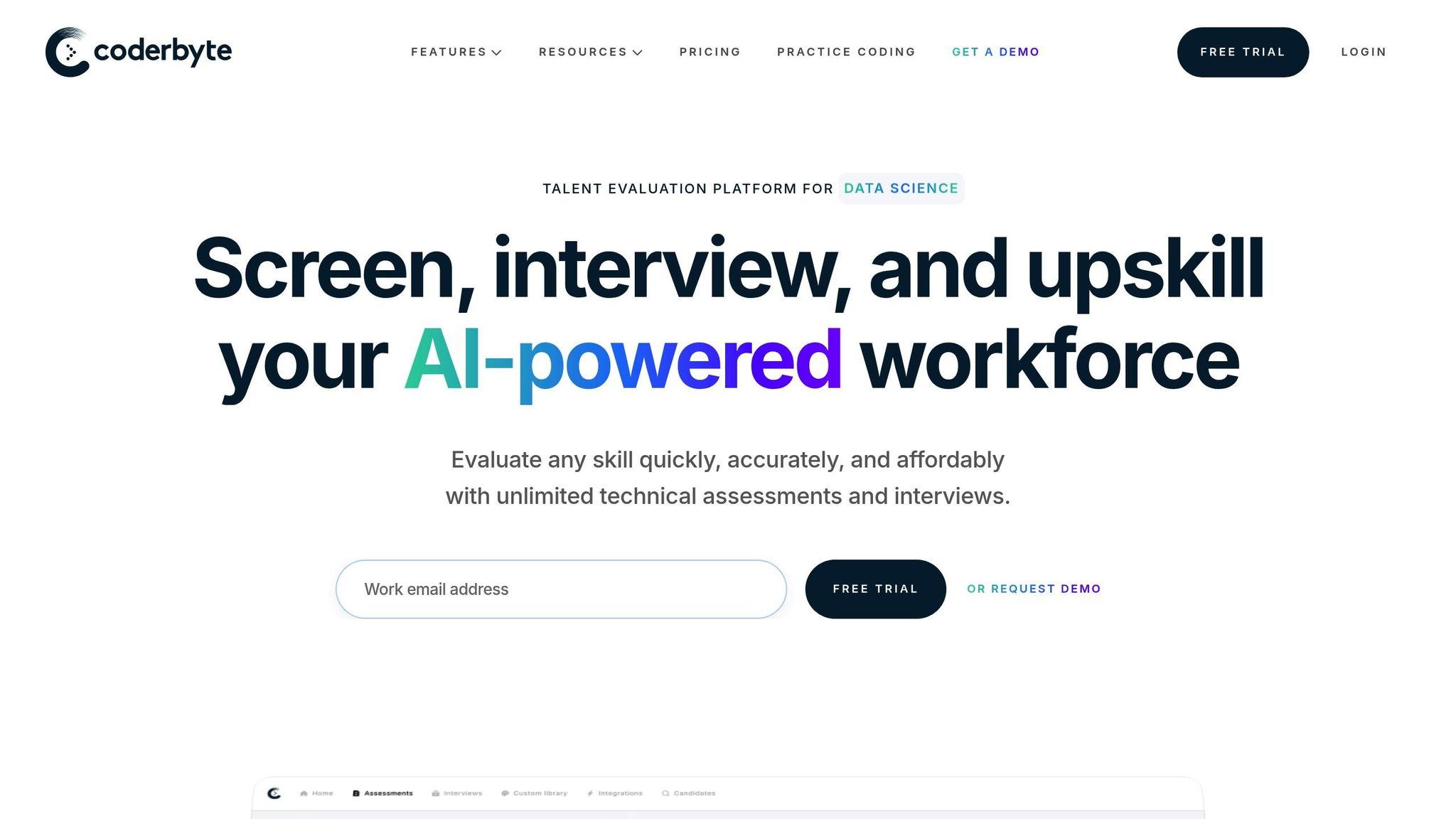
Coderbyte is a platform designed for coding challenges and recruitment, offering both pre-built and customizable tests to evaluate developer skills in languages like Python, JavaScript, and Java.
Similar to platforms like HackerRank, Coderbyte focuses on assessing technical skills through hands-on coding challenges.
Skill Assessment Capabilities
Coderbyte boasts an extensive library of coding challenges that test candidates' proficiency in various programming languages, including Python, JavaScript, and Java, among others . Beyond technical skills, it also evaluates technical and soft skills for diverse roles . Recruiters can create custom assessments tailored to specific job requirements using Coderbyte's "total customization" feature . This flexible testing system works seamlessly with its global reach, allowing companies to evaluate talent from a wide range of backgrounds.
Global Reach and Candidate Accessibility
The platform is well-suited for remote hiring, enabling candidates to complete assessments from anywhere in the world . This flexibility helps organizations broaden their talent search while accommodating different time zones . Trusted by over 1,000 companies globally, including Fortune 500 giants like Apple, Samsung, and Toyota , Coderbyte has established itself as a reliable tool for technical hiring. For companies needing compliance options, it also offers EU data residency features .
8. iMocha
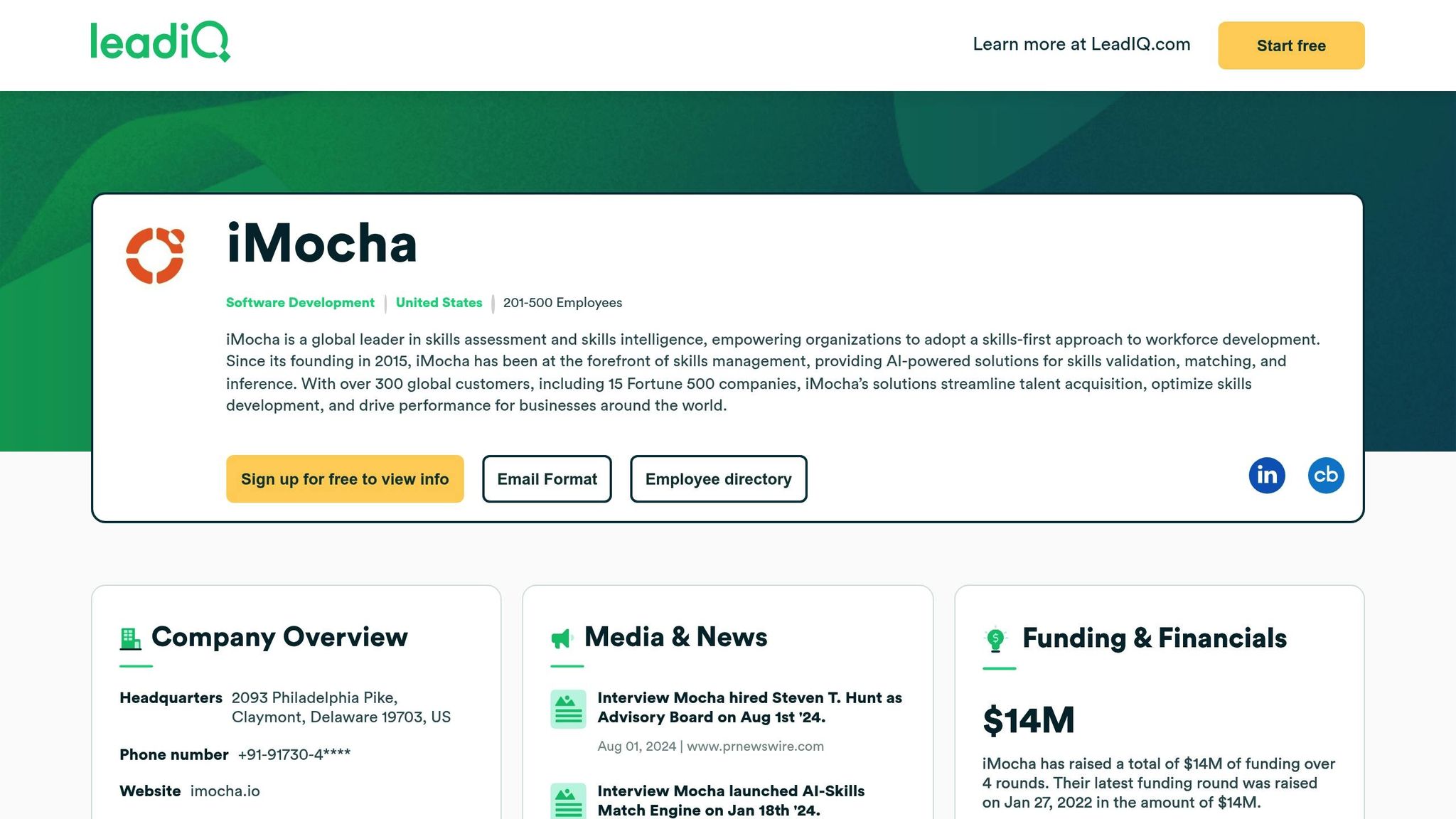
iMocha is a platform designed to assess technical skills through coding challenges and automated tests. It helps recruiters create detailed skill profiles for candidates during the hiring process.
Skill Assessment Features
iMocha offers a library of ready-made assessments for a variety of programming languages and modern technologies. It also allows companies to create custom tests and apply their branding, tailoring the experience to their specific needs.
Integration with Recruitment Tools
The platform works seamlessly with popular applicant tracking systems (ATS), automatically syncing candidate scores. It also supports custom API integrations, enabling automated triggers for assessments. These features streamline the recruitment process and audit your tech hiring stack for maximum efficiency.
Worldwide Accessibility and Security
iMocha is available globally, supporting multiple languages and devices so candidates can take tests from anywhere. It includes proctoring features to maintain test integrity and adheres to data protection regulations, ensuring secure and reliable remote assessments.
Tool Comparison Table
Here's a quick rundown of tools designed for sourcing coding-focused candidates:
| Tool | Primary Strength | Best For | Engagement Method | Pricing Model |
|---|---|---|---|---|
| daily.dev Recruiter | Warm, double opt-in connections with active developers | Reaching pre-qualified, engaged talent | Targeted job briefs tailored to developers | Transparent, consistent pricing |
| GitHub | Analyzing code repositories and showcasing project work | Assessing real-world coding and open-source contributions | Direct messaging and repository interactions | Free for basic searches |
| Stack Overflow | Highlighting technical expertise through Q&A participation | Identifying problem-solving abilities and community involvement | Profile messaging and talent solutions | Pricing depends on service level |
| CodinGame | Gamified coding challenges and competitions | Finding developers passionate about competitive programming | Contest participation and leaderboard rankings | Freemium model |
| Qualified.io | Real-time coding tests and assessments | Technical screening and live coding interviews | Integrated workflows for assessments | Subscription-based |
| HackerRank | Standardized coding challenges and tests | Large-scale technical evaluations | Messaging within the platform and challenge submissions | Tiered pricing plans |
| Coderbyte | Versatile coding assessments for various skill levels | Screening entry-level to mid-level developers | Invitations for assessments | Monthly subscription plans |
| iMocha | Skill testing with ATS integration | Automating large-scale technical screenings | Custom-branded assessments | Enterprise pricing structure |
Each platform brings something unique to the table, making them valuable components of a well-rounded recruitment strategy. For example, GitHub provides a window into a developer's actual coding contributions, making it a great tool for evaluating practical skills. Meanwhile, Stack Overflow offers a glimpse into problem-solving abilities, though its overall activity has been on a decline since May 2025 .
daily.dev Recruiter stands out for its ability to connect recruiters with pre-qualified, actively engaged developers through warm, double opt-in introductions, ensuring a more personalized approach to sourcing.
If you're incorporating AI into your recruitment process, keep in mind that many developer-sourcing tools now include advanced features like code analysis and contextual suggestions [25, 27]. However, tools like Sourcegraph cater primarily to larger enterprises and aren’t free .
To maximize the value of these tools, integrate them with your current ATS systems, train your team to use them effectively, and measure ROI using performance metrics . Remember, real coding activity provides clear signals of talent, and these tools help you identify and engage with that talent effectively.
Conclusion
The move toward coding-focused sourcing tools is reshaping tech recruitment. Instead of relying on outdated resumes or self-reported skills, recruiters are now evaluating candidates based on real coding activity - an approach already embraced by many industry leaders .
This shift offers more than just a better way to identify top talent. These tools allow recruiters to conduct precise searches based on specific skills, tech stacks, or project experience, making the hiring process more efficient. They also expand the talent pool by uncovering both active job seekers and passive technical candidates who might otherwise go unnoticed.
What truly sets this approach apart is the depth of insights it provides. By analyzing coding contributions, community engagement, and collaborative work, recruiters gain a clearer picture of a candidate's problem-solving abilities and teamwork - qualities that traditional methods often fail to capture.
Recognizing and referencing a candidate's coding contributions during outreach adds a personal touch that builds trust and encourages engagement. This strategy not only strengthens connections with potential hires but also enhances your competitive edge in attracting top developers.
As recruitment continues to shift toward skills-based and portfolio-driven methods, adopting these tools is no longer optional - it’s essential. The most effective hiring strategies blend the use of multiple platforms with personalized, thoughtful communication. By focusing on meaningful interactions and leveraging these tools, you can streamline your recruitment process and connect with the best talent in the industry.
FAQs
How can using tools like GitHub and HackerRank help us find better developer candidates?
Using platforms like GitHub and HackerRank can provide a much clearer picture of a developer's technical abilities and coding expertise. These tools go beyond the limitations of traditional resumes, offering insights into a candidate's real-world coding projects, contributions, and problem-solving skills.
Incorporating these platforms into your hiring process allows you to evaluate candidates based on tangible evidence of their work. This method helps you identify skilled developers more efficiently, streamline assessments, and make better-informed hiring decisions. Plus, it can save valuable time while increasing the likelihood of finding a developer who truly fits your team’s needs.
What makes daily.dev Recruiter more effective for connecting with developers than traditional hiring methods?
Using daily.dev Recruiter gives recruiters a smarter way to connect with developers by focusing on their real coding activity and skills. Instead of relying on resumes or general job boards, this platform lets you engage with developers who are actively involved in coding communities.
By narrowing the focus to active contributors, you can cut through unqualified candidates and spend your time on meaningful, real-time conversations with top tech talent. This not only speeds up the hiring process but also builds stronger connections with developers, making it easier to meet the fast-moving needs of the tech world.
How do gamified coding assessments help evaluate a candidate's technical skills?
Gamified coding assessments offer a dynamic and interactive way to gauge a candidate's technical abilities. By blending coding challenges with problem-solving tasks, they evaluate essential skills such as programming expertise, logical reasoning, and creative thinking - all within a more relaxed and engaging setting.
This method helps ease test-related stress, allowing candidates to showcase their abilities more naturally. Plus, these assessments mirror real-world scenarios, giving recruiters a clearer picture of a candidate's potential and making it simpler to pinpoint standout talent.


.png)